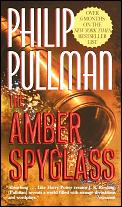
| Series: | His Dark Materials #3 |
| Publisher: | Del Rey |
| Copyright: | 2000 |
| Printing: | October 2001 |
| ISBN: | 0-345-41337-7 |
| Format: | Mass market |
| Pages: | 465 |
The Amber Spyglass is a direct sequel to The Subtle Knife and you definitely do not want to read this series out of order. There is very little concession to new readers; Pullman jumps right into the story.
I was hoping that Pullman would pull the series back to the feel of The Golden Compass after the change of tone for The Subtle Knife, and he did set that up at the end of the second book. My hopes were satisfied to a degree; there's more adventure in this book, more inventive world-building and neat ideas, and much less wandering about in a completely normal world. And yet, I came away from this series feeling like Pullman got derailed off his original series and ended up writing something rather different and not quite as good.
Lyra is out of it again for the first section of The Amber Spyglass, which is once again annoying. I think the real success off this series lives and dies by Lyra's presence. The other characters are adequate supporting characters, but they're just that. I don't think even Will develops far enough to carry the story by himself, which means that Pullman's move away from a tight focus on Lyra to a more conventional multiple-viewpoint novel is rather disappointing. The first section of the book is also setup for quite a few separate plot threads, so it ends up feeling a touch fragmented.
Once things start happening, though, Pullman delivers on the action. The whole series is a grand adventure that never feels like a simple item collection quest or map exploration, something that's too rare in fantasy. Pullman also does a lot of character development and writes strong emotions and difficult decisions without letting the characters wallow or ruin the pace of the story. Structurally, apart from my disappointing in the shift of perspective, this is a well-written, well-paced novel.
Pullman attempts something else in characterization that's equally rare and rather more difficult: this book has very few true villains. Nearly all of the characters with narrative introductions that lead you to expect them to stay in the villain role end up having other redeeming or at least understandable qualities, and frequently Pullman left me rooting in surprise for what I thought was the "wrong" side. With this, he's not always successful; Mrs. Coulter, for instance, felt like she got a personality transplant between books, and if the changes in her motivations were signalled in the previous books, I certainly missed the signs. Still, I'll forgive the occasional problems when the overall effect is so unusual and intriguing. I like reading a story that starts as traditional fantasy and then makes it clear that the sides aren't anywhere near as well-defined as they first appeared.
The Amber Spyglass is most notorious for its assault on religion and Christianity in particular, and yes, it's rather pointed. Pullman presents the Church and its spiritual superior in his universe as a sick fraud and provides a mystical humanist alternative as the real truth, down to Heaven being a lie and souls left trapped in a Hades-style holding area. It produces an odd effect since it's so different than the standard lines about gods and heavens that one normally sees in fantasy, even fantasy that isn't explicitly religious, but I didn't mind it. Pullman pulls it off rather well and gives it emotional verisimilitude for his characters. On the other hand, it was also occasionally as preachy as Christian religious fantasy, just in a different direction, and I don't think it added much to my enjoyment of the books over a more traditional mythical setting.
More of a problem, though, is that the rest of the logic and metaphysics of his world just don't hold together well. Why is the relationship between Dust and innocence talked about constantly throughout the series when it clearly has nothing to do with traditional innocence or open-mindedness? What logical justification is there for the final revelation of what attracts Dust the most strongly? I can see ways in which Pullman could have set up that revelation, but he didn't, and it feels like cheating, tossing in an effect completely out of the blue at the last minute. The world and evolution of the mulefa is particularly hard to believe in, full of convenient coincidences. The alethiometer is never adequately explained, and Lyra's interaction with it at the end of the book again comes out of nowhere and is extremely unsatisfying. There are more problems like this. In the final analysis, the substance of Pullman's world doesn't withstand poking very well.
All that being said, this is not a bad book, just a good book that could have been better. I was hoping that Pullman would pull everything together into a killer conclusion that would live up to the promise of the first book, and unfortunately that didn't happen. He did, however, write a decent conclusion that takes a lot of chances and a very unconventional approach, down to its emotionally difficult ending. I think the handling of Will's daemon sums up my reaction to the whole book: there are glimmers of the intensity that I was looking for, but it still felt like a badly missed opportunity for something truly powerful.
Worth reading, if not the novel that I was hoping for.
Reviewed: 2005-11-03